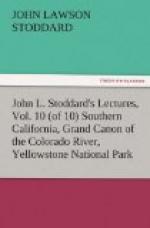The navigation of this river by Major J.W. Powell, in 1869, was one of the most daring deeds of exploration ever achieved by man, and the thrilling story of his journey down the Colorado, for more than a thousand miles, and through the entire length of the Grand Canon, is as exciting as the most sensational romance. Despite the remonstrances of friends and the warnings of friendly Indians, Major Powell, with a flotilla of four boats and nine men, started down the river, on May 24th, from Green River City, in Utah, and, on the 30th of August, had completed his stupendous task, with the loss of two boats and four men. Of the latter, one had deserted at an early date and escaped; but the remaining three, unwilling to brave any longer the terrors of the unknown Canon, abandoned the expedition and tried to return through the desert, but were massacred by Indians. It is only when one stands beside a portion of this lonely river, and sees it shooting stealthily and swiftly from a rift in the Titanic cliffs and disappearing mysteriously between dark gates of granite, that he realizes what a heroic exploit the first navigation of this river was; for nothing had been known of its imprisoned course through this entanglement of chasms, or could be known, save by exploring it in boats, so difficult of access were, and are, the two or three points where it is possible for a human being to reach its perpendicular banks. Accordingly, when the valiant navigators sailed into these mysterious waters, they knew that there was almost every chance against the possibility of a boat’s living in such a seething current, which is, at intervals, punctured with a multitude of tusk-like rocks, tortured into rapids, twisted into whirlpools, or broken by falls; while in the event of shipwreck they could hope for little save naked precipices to cling to for support. Moreover, after a heavy rain the Colorado often rises here fifty or sixty feet under the veritable cataracts of water which, for miles, stream directly down the perpendicular walls, and make of it a maddened torrent wilder than the rapids of Niagara. All honor, then, to Powell and his comrades who braved not alone the actual dangers thus described, but stood continually alert for unknown perils, which any bend in the swift, snake-like river might disclose, and which would make the gloomy groove through which they slipped a black-walled oubliette, or gate to Acheron.
[Illustration: A CABIN ON THE TRAIL.]
[Illustration: A HALT.]
[Illustration: AT THE BOTTOM.]
[Illustration: TAKING LUNCH NEAR THE RIVER.]
[Illustration: BESIDE THE COLORADO.]




